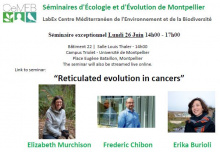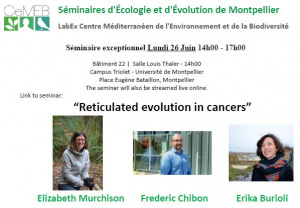Seminaire “Reticulated evolution in cancers” Elizabeth Murchison Frederic Chibon Erika Burioli

SEMINAIRE EXCEPTIONNEL SEEM
14h00: Horizontal gene transfer in a transmissible cancer
Elizabeth Murchison, Department of Veterinary Medicine, University of Cambridge, UK - epm27@cam.ac.uk
Although somatic cell genomes are usually entirely clonally inherited, sporadic exchange of nuclear DNA between cells of an organism by a process of cell fusion, phagocytosis, or through other mechanisms, can occur. This phenomenon has long been noted in the context of cancer, where it could be envisaged that horizontal gene transfer plays a functional role in disease evolution. However, an understanding of the frequency and significance of this process in naturally occurring tumours is lacking. I will describe the results of a screen that searched for horizontal gene transfer in transmissible cancers occurring in dogs and Tasmanian devils.
15h00: Cell fusion in oncogenesis of sarcomas
Frederic Chibon, ONCOSARC: Oncogenèse des sarcomes, Oncopole Toulouse, France - frederic.chibon@inserm.fr
It is now quite well accepted that oncogenesis of human solid tumors involves genome doubling. This point has been observed for decades and is now rediscovered by large sequencing programs. Nevertheless, the question of the mechanism(s) leading to this doubling is not sufficiently addressed. There are three possible mechanisms: endoreplication, abortive cytokinesis and cell fusion. By studying intra-tumor heterogeneity, we have demonstrated that pleomorphic sarcoma cells are capable to fuse and to produce hybrids with new genome, metabolism and oncogenic properties. Pleomorphic sarcomas are rare cancers that develop at the expense of mesenchymal tissue and have an extremely rearranged genome. Cell fusion is part of the differentiation and the physiology of mesenchymal cells, myoblasts, macrophages and osteoclasts. In the context of oncogenesis, tetraploidization by cell fusion induces massive genome rearrangements, differing according to cell type and modifying cell properties toward transformation and metastatic spreading.
16h00: Cell fusion in a mussel transmissible cancer
Erika Burioli, Interactions Hôtes-Pathogènes-Environnements, Université de Montpellier, France - erikaastrid.burioli@gmail.com
Transmissible cancers are fascinating life-forms persisting within host populations for hundreds or thousands of years by the direct transfer of cancerous cells between individuals. Eight distinct lineages have been described infecting marine bivalves so far. One intriguing characteristic of these lineages is that they are all hyperploid, ranging from 4N to 20N. While the exact mechanisms leading to hyperploidy in these cancers have not been definitively identified, we have shown that genetically distinct sub-lineages affecting mussels are prone to fuse together during co-infections. This fusion event, known as alloploidization, could play a role in counteracting the deleterious burden and generating genetic diversity. Indeed, mussel transmissible cancers could increase their ability to persist within host populations over long periods benefiting from whole-genome duplications.
16h30: Discussion
Contact: Nicolas Bierne (ISEM) nicolas.bierne@umontpellier.fr
Watch previous seminars on our YouTube channel:
https://www.youtube.com/channel/UCrX4IsZ8WIFcDa0ZmC7rcQg



